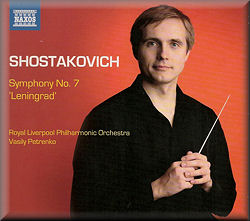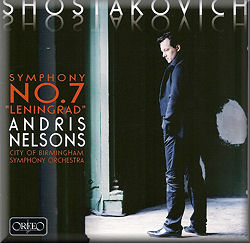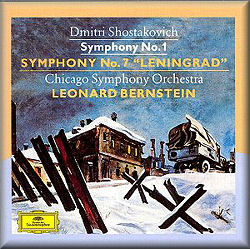|

Support
us financially by purchasing this disc from |
|
|
|
|
|
|

|
Support us
financially by purchasing this disc from
|
|
|
|

|
Support us
financially by purchasing this disc from
|
|
|
|
|
|
|
|
Dmitri SHOSTAKOVICH (1906-1975)
Symphony No. 7 in C major, Op. 60 Leningrad (1941)
Royal Liverpool Philharmonic Orchestra/Vasily Petrenko
rec. 1-3 June, 2012, Philharmonic Hall, Liverpool.
NAXOS 8.573057 [79:15]
Dmitri SHOSTAKOVICH (1906-1975)
Symphony No. 7 in C major, Op. 60 Leningrad (1941)
City of Birmingham Symphony Orchestra/Andris Nelsons
rec. live, 10/12, November 2011, Symphony Hall, Birmingham. DDD
ORFEO C 852 121 A [75:29]
Comparison
Dmitri SHOSTAKOVICH (1906-1975)
Symphony No. 7 in C major, Op. 60 Leningrad (1941)
Chicago Symphony Orchestra/Leonard Bernstein.
rec. live, 21/22 June 1988, Orchestra Hall, Chicago.
DEUTSCHE GRAMMOPHON 477 7587 [84:49] ( review)
I’ve reviewed most of Vasily Petrenko’s Shostakovich cycle for Naxos.
The previous recordings have been generally well received though some
knowledgeable commentators have expressed reservations. For myself,
I’ve generally been impressed and I was pleasantly reassured to find
recently that Petrenko’s account of the Fifteenth Symphony held its
own in many respects against a fine live version from Bernard Haitink,
a noted Shostakovich exponent (review).
So I was keen to hear what Petrenko would make of the ‘Leningrad’,
the more so since this gave me the opportunity to compare it with
the recently released recording by Andris Nelsons, which has attracted
mixed reactions from two of our seasoned critics (review).
I’ve also brought into the equation Leonard Bernstein’s 1988 recording.
It’s a truism that timings aren’t always a reliable guide but I think
on this occasion it’s worth setting out the timings for the various
movements in the three versions because these do give some pointers
to the approaches of our respective maestros.
| Movement |
I |
II |
III |
IV |
Total |
| Petrenko |
28:32 |
12:58 |
18:44 |
19:01 |
79:15 |
| Nelsons |
26:07 |
11:00 |
19:36 |
16:58 |
73:44 |
| Bernstein |
31:43 |
14:50 |
19:25 |
18:51 |
84:49 |
The total timing for the Nelsons performance is less than the
time quoted in the review heading, which is the total playing time
of the disc. After the music stops there’s a vociferous ovation, which
is only faded out after 1:25. That’s absolutely ludicrous in my view:
who wants to listen to applause on a CD for such a long time? The
Bernstein performance, though live, is not followed by any applause.
I was disconcerted by the very start of Vasily Petrenko’s performance.
Every note of the opening string theme is played right through in
such a way as to sound almost legato. I’ve never heard it played quite
like this. To me the result sounds portentous and stilted. Bernstein,
at a similar tempo to Petrenko, shows how a conductor can get the
orchestra to play through the notes and yet at the same time imbue
each one with momentum and energy. Nelsons is very brisk in his opening,
investing the music with great urgency but I’m inclined to think that
while this would be a stirring call to attention in the concert hall
it’s too extreme for repeated listening. Incidentally, his tempo is
almost identical to that adopted by his mentor, Mariss Jansons, in
his 1988 EMI recording with what was then the Leningrad Philharmonic.
Both Petrenko and Nelsons handle the long G major violin theme and
the lyrical episode that flows from it very well.
The ‘non-Development’ section, consisting of a dozen repetitions of
the same banal theme in a Bolero-like crescendo is well-known
– or notorious, depending on your point of view. I’m in the camp that’s
disposed to give Shostakovich the benefit of the doubt here; after
all, we know he could ‘do’ symphonic development so he must have had
a purpose in this passage and his comment in a 1951 article entitled
‘On True and So-called Programme Music’ that this was the “Invasion
Theme” is entirely plausible, especially since the crescendo suggests
an army approaching from the distance. In his review
Dan Morgan thought Nelsons’ phrasing of the theme was rather odd,
though I didn’t find myself distracted. Petrenko takes the episode
at a much steadier pace and, to be honest, I think he miscalculates
here; his measured, relentless approach is a bit too much of a good
thing, though I can see his point. Bernstein is fractionally quicker
than Petrenko but for some reason that I can’t quite put my finger
on he gets away with the steady approach in a way that Petrenko doesn’t
quite manage.
With the towering climax that is the culmination of the ‘Invasion
Theme’ we come to an issue with the Nelsons recording that both Simon
Thompson and Dan Morgan noticed: the closeness of the sound. Having
been to many concerts in Symphony Hall my guess is that, with an audience
present in the stalls, the engineers had no option but to place all
their microphones onstage or above the orchestra. Shostakovich calls
for eight horns, six trumpets and six trombones and a tuba and, boy,
do we know it in the Nelsons recording! The brass are overpowering
at this climax and elsewhere; it’s just too much. Though the DG engineers
were also working, I presume, in a full auditorium they manage this
aspect much more successfully. Recording in what I assume was an otherwise
empty Philharmonic Hall the Naxos engineers put a satisfactory amount
of distance round the sound of Petrenko’s orchestra and though you
can tell the performance is taking place in an empty hall I find the
sense of space is not unpleasing. Bernstein’s climax is simply immense.
He makes the passage more intense than I can ever recall hearing it;
the Chicago percussion section’s contribution is menacing and the
orchestra as a whole plays with awesome power.
All our conductors are largely convincing in the extended lyrical
but melancholic section between the climax and the end of the movement
and all are well served by their solo bassoonists in the extended
threnody for that instrument. Nelsons unsettles me at one point (23:15-23:41)
where he suddenly speeds up to his tempo primo; the trouble is that
his tempo primo was so fast that now this particular passage jars.
There’s a surprising variance of views about the second movement.
I’m not sure how helpful it is to know that Shostakovich initially
entitled the movement ‘Memories’ – he gave titles to all four movements
but fairly quickly withdrew them. However, the nature of the music
suggests strongly that he intended a contrast, perhaps even a relaxation,
after the draining first movement – to which he had given the title
‘War’. It seems to me to work best if treated as a quasi-Intermezzo,
the opening string material light and delicate and the oboe solo that
grows out of this material wistful. There follows a central episode
in 3/8 time which is in Shostakovich’s sardonic and biting vein, with
pungent contributions from the woodwind, not least the strident, wailing
E-flat clarinet at the start. Nelsons starts well – and in these quieter
passages the recording is much more satisfactory – and his CBSO strings
and woodwind make a good showing. The quicker episode (from 4:45)
is led off by a grotesque E-flat clarinet – and I mean that as a compliment.
What lets Nelsons down is that the loud music sounds oppressive, at
least as recorded. Petrenko is somewhat steadier, though the music
is nicely articulated. At Petrenko’s more measured speed the plangent
oboe solo comes across very expressively. However, after a while I
began to feel that his pacing was too sober, the music too moulded.
The 3/8 passage is also steady. I’m afraid that Petrenko misses the
sardonic element of this quicker section and it all sounds rather
heavy-handed. This section has a real three-in-a-bar feel to it in
his hands whereas with his rival there’s no doubt that it’s one beat
to the bar, as it surely should be. Towards the end of the movement
there’s an extended bass clarinet solo accompanied at first by soft,
shimmering strings and later by equally quiet flutes. This is superbly
realised by Petrenko’s players. However, overall I have to say I feel
Petrenko has misjudged this movement. Bernstein is equally deliberate
in this movement and despite an eloquent oboe solo (Ray Still?) and
much typically characterful shaping by Lennie I am much less convinced
by him in this movement than elsewhere in the symphony.
The slow movement begins with a broad chorale for wind and brass answered
by a declamatory theme on the violins. All this is strongly projected
in Birmingham. There follows a quicker section, marked moderato
Risoluto. Nelsons invests the moderato risoluto with
tremendous drive. Is it, however, too swift, I wonder? When
the side drum joins the fray, propelling the music forward (9:27)
I had the impression that the music was being rushed too much; the
drum rhythm sometimes sounds unstable. On balance I think Nelsons
is too impetuous in this passage and the climax, when it arrives,
feels short winded. He’s much more convincing when the slow music
returns. The long viola theme (from 13:20) is given out with lovely,
rich tone and is beautifully phrased Listen to the breathtaking pp
that the CBSO strings achieve while playing the chorale (15:22-16:13);
hereabouts there is some outstandingly sensitive playing and Nelsons’
handling of the last few minutes of the movement and of the transition
to the finale is very convincing.
Petrenko is weighty at the start of the slow movement, both in the
wind/brass chorale and the answering declamatory phrases on the violins.
The important flute solo (from 3:56) is extremely well played and
I liked the beautifully judged weighting of the soft accompaniment.
At the moderato risoluto he matches Nelsons for urgency but
unlike his Latvian colleague I never had the feeling that the music
was threatening to run out of control. The viola melody is well enough
done but I don’t think the playing is quite as expressive as that
which we hear from the CBSO. Petrenko and his orchestra do the closing
minutes of the movement effectively.
But then along comes Bernstein to spoil everyone else’s party. Up
to this point I had used the Bernstein recording to make spot comparisons
of various sections. However, I decided to check his handling of the
opening of the third movement and I was hooked; I listened right through
to the end of the symphony. It’s perfectly possible to criticise Bernstein
for expansiveness in this score but his epic reading offers a very
special experience indeed and nowhere more so than in this third movement.
The music commands our attention at the start: the chorale
is hugely imposing and pregnant with tension and then the violins
play their declamatory phrases as if their very lives depended on
it. This presages an amazingly intense reading of the movement in
which you can sense Lennie living and breathing every phrase. This
is great conducting, aided and abetted by peerless playing from the
mighty Chicago orchestra. And lest you should think that everything
is overwrought, the heart visibly on Bernstein’s sleeve, that’s not
so; for example he has the viola melody played with a simple eloquence
that, arguably, neither of his rivals matches and yet it still makes
its mark. Bernstein makes this movement, which Shostakovich initially
thought to entitle ‘Our Country’s Wide Spaces’, overwhelmingly tragic.
All the conductors manage the hushed attacca transition to
the finale very well. Originally entitled ‘Victory’, the movement
is not without its strident, even banal passages but, equally, there’s
much in Shostakovich’s music that’s impressive. Once Nelsons gets
to the main allegro he moves the music on at a furious pace
and whilst I’m sure this was electrifying in the concert hall I find
it rather wearing on repeated listening and the usually impeccable
CBSO seems to be a little untidy at times. The solemn moderato
(5:51) comes as something of a relief but I don’t feel Nelsons invests
this episode with sufficient gravitas because he’s not slow enough
in his pacing, though there’s some admirable soft playing to savour
at times, which certainly generates atmosphere. In the build-up to
the end of the movement I’m unconvinced by the way Nelsons slams on
the brakes for the prominent melody on unison horns (13:37), which
the close recording ensures is very prominent. Inevitably
the close recording is something of an issue in the last few, very
loud minutes.
Petrenko’s performance is sharp and alert once the allegro
has emerged from the shadowy transition passage. He generates excellent
momentum and bite and, though their timings are pretty similar, the
music doesn’t sound as hard driven in his hands as compared with Nelsons.
The solemn moderato – a homage to those who lost their lives
in the struggle for Victory? – is well done and the responsive RLPO
offers some excellent soft playing even if they’re not as daringly
subdued as their Birmingham colleagues. Petrenko handles much of the
lead-up to the ending impressively. However, I feel his ending (from
16:57) is somewhat overblown; his tempo is extremely spacious and
within this already slow speed he makes several further rhetorical
slowings. To be honest, he makes rather a meal of the ending.
Bernstein’s finale is magnificent. It’s noteworthy that he takes the
allegro a little more steadily than the other conductors
and in his hands the moderato broods as with no one else.
The very end is hugely imposing, the full power of the Chicago Symphony
unleashed.
It’s time to sum up. Nelsons has many points in his favour and I’m
sure that had I been in Symphony Hall for one of these live performances
I’d have found it a stirring and exciting experience as, clearly,
the Birmingham audience did. However, two things weigh heavily with
me. One is Nelsons’ tendency to rush his fences on several occasions
and the other is the close recording which doesn’t do justice to the
fabulous acoustics of the hall and which makes the sound oppressive
in loud passages – of which there are many in this score. I’m sure
that at the actual performances, with the sound able to breathe and
expand in the hall, the results were very different from what we hear
on this CD. I’ve rarely been disappointed by a Nelsons performance,
whether live or on disc but this time I am. This is not in the same
league as his gripping Lucerne account of the Eighth, given just a
couple of months earlier (review).
There’s a good booklet note by Andreas Wehrmeyer.
Petrenko’s recording is in a lower price bracket and the purchaser
will get a useful note, as usual with this series, from Richard Whitehouse.
There are features of Petrenko’s interpretation over which I have
reservations but the performance is well played. Some may find the
recorded sound a drawback. It’s not as ‘present’ as some I’ve heard
and might be felt to lack some impact but it’s clear and you get a
good perspective on the orchestra, albeit in an empty hall. I rather
liked the sound but perhaps my thinking was influenced by hearing
the Petrenko recording after the Nelsons disc.
Then there’s Lennie. Even if you buy either of the other versions
that I’ve been considering here you must hear Bernstein.
Yes, he’s expansive – at thirty-one minutes the first movement is
very long - and I’m less than fully
convinced by his way with the second movement – but he carries you
with him. His is a mighty, intense conception and the Chicago Symphony
brings that conception to life with awesome playing. My colleague,
Bob Briggs summed up the Bernstein recording as "Not so much a
must-have as a can't live without". How right he was.
John Quinn
Previous review (Bernstein)
Bob Briggs
Reviews of the Petrenko Shostakovich cycle on MusicWeb International:-
Symphonies
1 and 3
Symphonies
2 and 15
Symphonies
5 and 9
Symphonies
6 and 12
Symphony
8
Symphony
10
Symphony
11 and an
alternative view
|














